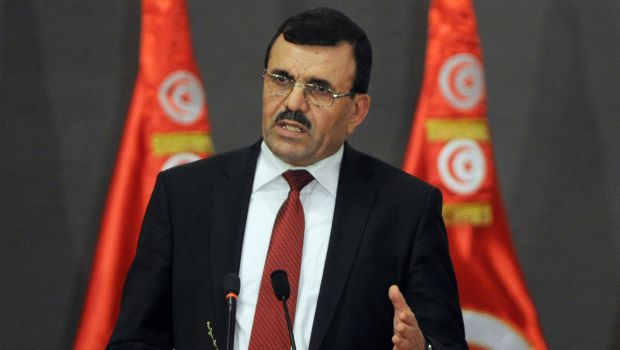
File photo—Tunisian prime minister Ali Laarayedh speaks during a meeting as part of the dialogue between Tunisia’s ruling Islamists and the opposition on October 5, 2013. (AFP PHOTO / FETHI BELAID)
Laarayedh and his party, the Islamist Ennahda Movement, previously agreed to resign from government in favor of an independent caretaker cabinet prior to new elections, as part of an agreement with a coalition of opposition parties following months of political unrest.
In a televised interview broadcast on Tunisian Channel 1, Laarayedh called for the ratification of Tunisia’s new constitution, the reform of the authorities responsible for overseeing the elections, the publication of new election procedures, and the setting of a clear date for the forthcoming presidential and parliamentary elections, before the dissolution of the current government.
The prime minister claimed that this will help ensure that the process of “one government resigning and the other taking over” goes as smoothly as possible to ensure that country does not experience a political vacuum.
“Tunisia cannot handle the resignation of the government for long,” he added.
The date of resignation of the current government was left open by Laarayedh: “there is not a definitive time yet for the resignation of the current government.”
Laarayedh proposal clashes with a three-week deadline set within the political roadmap that was accepted in order to end the on-going crisis between the government and the opposition.
In response to accusations from the opposition that Laarayedh’s Ennahda Movement was stalling the process and extending preliminary discussion sessions to gain time, Laarayedh said the problem confronting the transition process was not the resignation of the government, but the need to maintain administrative continuity in the transitional phase and “creating a solid foundation for a democratic environment.”
“It is not possible to apply the roadmap to the letter because it does not set out a clear agenda for future developments, including establishing an independent electoral commission,” he said.
In the same interview, Laarayedh downplayed accusations of failure leveled by the opposition at his government, saying Tunisia has fared well in comparison to the other states of the Arab Spring, especially with regards to security and stability.
He added that Hamadi Jebali, the Secretary-General of the Ennahda Movement will not run for the presidency. Laarayedh has denied that he will run for president on previous occasions.
Laarayedh also conceded that there had been failures in security, leading to the assassination of Mohamed Brahmi, a left-wing MP who was shot dead in July, an act which contributed greatly to Tunisia’s political crisis. The outlawed Ansar Al-Shari’a group has been accused of carrying out the murder.
“We have noted the mistakes in the case of Brahmi,” he said.
With regards to neighboring Libya, Laarayedh said that the situation was complex, and that Libya needed to establish new state institutions. He said this was a serious topic as Tunisia’s security depends on Libyan security and Tunisia worries about weapons being imported from Libya.
He also denied the existence of any accurate information on the quantity of weapons trafficked into Tunisia from neighboring Libya.
